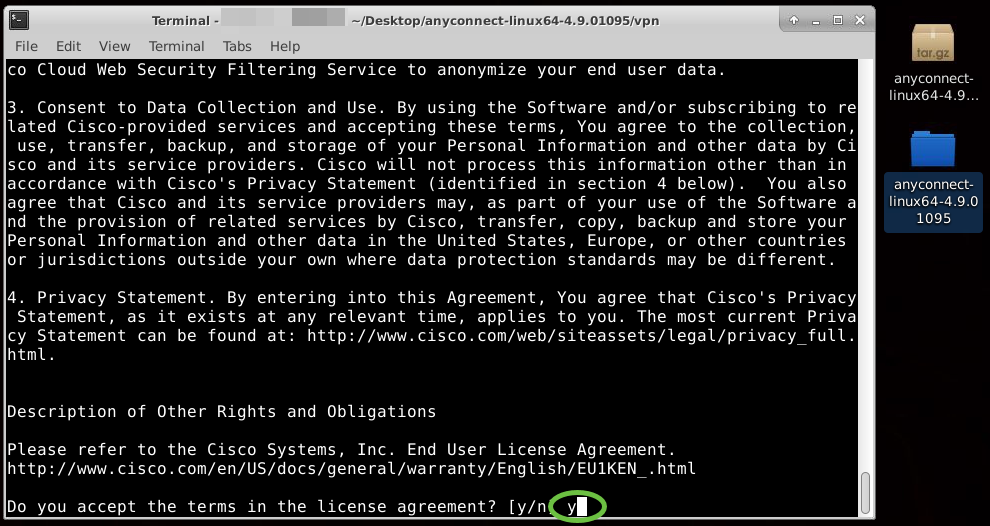Cisco Anyconnect Linux Command Line
Yeah, looks like AnyConnect's GUI is completely ignorant of what's on the command line. I can think of a couple options: Avoid the UI completely, and use vpncli.exe that's included by AnyConnect's installer; Wrap a batch file around the vpnui.exe launch, swapping out the preferences.xml file with one containing the desired host. (on win7, my preferences.xml is in my profile at AppDataRoaming.
- Anyconnect Linux Client
- Cisco Anyconnect Linux Command Line Download
- Start Cisco Anyconnect From Command Line Linux
- Cisco Anyconnect Linux Install
Cisco AnyConnect Secure Mobility Client – Linux Installation
The newest Cisco AnyConnect Secure Mobility Client is now available for use on many Linux distros in use by the BU community. Depending on which Linux distro you use, there may be some dependencies and configurations required. Installation instructions are provided below for the more common distros in use at BU.
CentOS 6
CentOS 6
No dependencies required

- Open a web browser and navigate to vpn.bu.edu
- Authenticate with your BU login
- When prompted, click the link to download the install script
- Allow execution on the downloaded script:
chmod +x /path/to/anyconnect-linux64-4.4.03034-core-vpn-webdeploy-k9.sh Free arcade game for mac.
- Execute the script as root

sudo /path/to/anyconnect-linux64-4.4.03034-core-vpn-webdeploy-k9.sh
- After installation is complete, Cisco AnyConnect will appear in your applications menu. If you are using the command line, you can connect with the following command:
/opt/cisco/anyconnect/bin/vpn connect vpn.bu.edu[/pool]
CentOS 7
- Apr 07, 2021 Cisco AnyConnect: auto login in silent mode. This gist is for Linux. For windows is the same thing. Create a file.logininfo as below. Connect your.server.url usernanme password (blank line).
- More advanced invocation with username and password. Input the password after running the command. # openconnect -u user-passwd-on-stdin vpnserver. Often VPN providers are offering different authentication groups for different access configurations like for example for a full tunnel or split tunnel connection.
- ModuleInstalled CommandandLogFile msiexec/package anyconnect-win-ver-pre-deploy-k9.msi/norestart /passive DISABLECUSTOMEREXPERIENCEFEEDBACK=1 /lvx.
- AnyConnect Linux uses Firefox certificate store (NSS) as default, if it fails then it would turn to use Linux OS certificate store. Note: Currently, AnyConnect on a Linux OS doesn’t support GNOME Keyring so AnyConnect won’t able to use the certificate imported to the GNOME Keyring.
CentOS 7
- Install dependencies:
sudo yum install epel-release
sudo yum install pangox-compat
- Open a web browser and navigate to vpn.bu.edu
- Authenticate with your BU login
- When prompted, click the link to download the install script
- Allow execution on the downloaded script:
chmod +x /path/to/anyconnect-linux64-4.4.03034-core-vpn-webdeploy-k9.sh
- Execute the script as root
sudo /path/to/anyconnect-linux64-4.4.03034-core-vpn-webdeploy-k9.sh
- After installation is complete, Cisco AnyConnect will appear in your applications menu. If you are using the command line, you can connect with the following command:
/opt/cisco/anyconnect/bin/vpn connect vpn.bu.edu[/pool]

Ubuntu 18.04
Ubuntu 18.04
Ubuntu 18.04 is currently unsupported with the Cisco AnyConnect Secure Mobility Client.
Ubuntu 16.04
Ubuntu 16.04
No dependencies required
- Open a web browser and navigate to vpn.bu.edu
- Authenticate with your BU login
- When prompted, click the link to download the install script
- Allow execution on the downloaded script:
chmod +x /path/to/anyconnect-linux64-4.4.03034-core-vpn-webdeploy-k9.sh
- Execute the script as root
sudo /path/to/anyconnect-linux64-4.4.03034-core-vpn-webdeploy-k9.sh
Anyconnect Linux Client
- After installation is complete, Cisco AnyConnect will appear in your applications menu. If you are using the command line, you can connect with the following command:
/opt/cisco/anyconnect/bin/vpn connect vpn.bu.edu[/pool]
Ubuntu 14.04
Ubuntu 14.04

No dependencies required
- Open a web browser and navigate to vpn.bu.edu
- Authenticate with your BU login
- When prompted, click the link to download the install script
- Allow execution on the downloaded script:

chmod +x /path/to/anyconnect-linux64-4.4.03034-core-vpn-webdeploy-k9.sh
Cisco Anyconnect Linux Command Line Download
- Execute the script as root
sudo /path/to/anyconnect-linux64-4.4.03034-core-vpn-webdeploy-k9.sh
Start Cisco Anyconnect From Command Line Linux
- After installation is complete, Cisco AnyConnect will appear in your applications menu. If you are using the command line, you can connect with the following command:
Cisco Anyconnect Linux Install
/opt/cisco/anyconnect/bin/vpn connect vpn.bu.edu[/pool]
